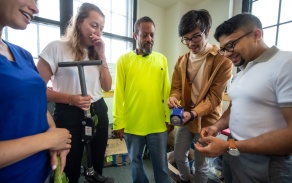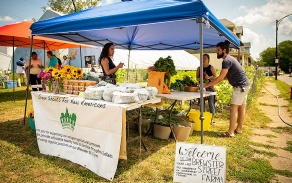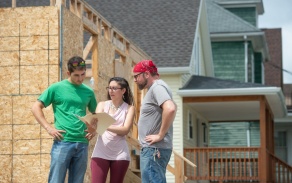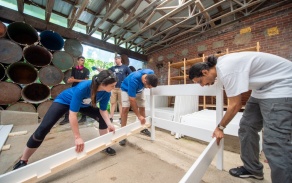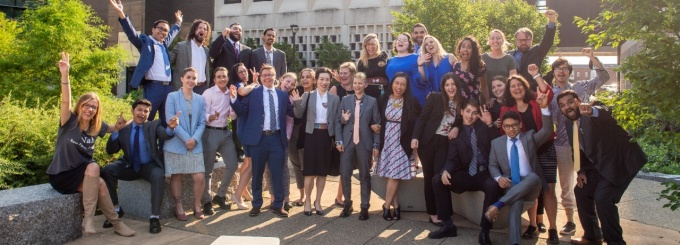Changing Lives Through Social Work Partnerships
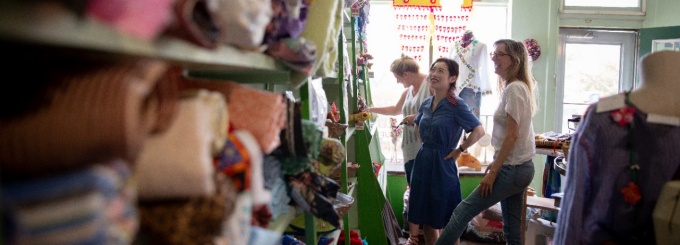
UB's Social Impact Fellows continue to make an impact in Buffalo and beyond
By Mike Gluck
Providing low-cost prosthetics to amputees in third world countries. Giving vegetable gardens to refugees on Buffalo’s West Side. Building beds for kids who have nowhere else to sleep.
These are just a few of the ways that UB’s Social Impact Fellows (SIF) are making a real difference in Buffalo—and around the globe.
Last summer was the third year for UB’s Social Impact Fellows program—a unique initiative co-founded by the Schools of Social Work and Management. Through the program, UB places interdisciplinary teams of graduate students in internships with local mission-driven organizations. The program is offered in collaboration with UB’s Blackstone LaunchPad powered by Techstars, a campus-based entrepreneurship center.
Each Social Impact Fellows team includes three students: a master’s student in social work brings a trauma-informed and human rights perspective to the team, an MBA student employs his business and leadership skills, and a student from the College of Arts and Sciences offers research-based support for each project.
A Summer of Learning
For 10 weeks during the summer, the Social Impact Fellows spent four days each week on-site with their organizations, then one day a week learning how to identify and define social challenges, generate sustainable solutions and practice entrepreneurial principles. Students worked with a variety of companies, nonprofit organizations and government agencies on some of today’s most pressing issues, from voting reform and supporting the needs of the aging population, to helping survivors of domestic violence.
“The Social Impact Fellows program is about bringing diverse students and perspectives together in a blended disciplinary model to change the way all of us—students, faculty and community partners—view things,” said Nancy J. Smyth, dean of the School of Social Work.
The culmination of the program was the annual Pitch for a Cause competition on August 2. Standing at the front of a packed lecture hall, each team of Social Impact Fellows had five minutes to tell a panel of judges about their work and its impact on the community.
Following a series of impressive presentations, the judges had some tough decisions to make. Second place in the competition (and $1,000 for the partner organization) went to the team working on The Service Collaborative of WNY’s Beds for Buffalo program, which constructs beds for children who are living in poverty.
The coveted first-place prize—along with $2,000 for the partner organization—went to the team who had worked with Stitch Buffalo, a local nonprofit organization dedicated to helping refugee women. At Stitch Buffalo, refugee women learn how to make hand-sewn textile art products—including beautifully embroidered peace pins, heart ornaments and custom pieces for corporate gifts and bridal parties— and then sell their work through Stitch’s online or physical store (on Niagara Street, on Buffalo’s West Side), or on their own. Through this experience, the women gain greater financial independence, learn new life skills, and are able to share some of their cultures’ artistic traditions.
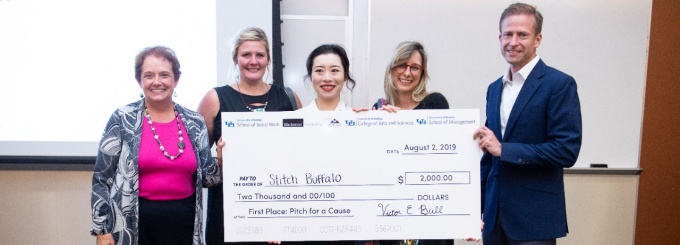
Stitch Buffalo's first place team poses with their prize. Left to right: Nancy Smyth, Shannon Lach, Xingyu Chen, Kristie Bailey, Paul Tesluk
A Warmer Welcome to the City of Good Neighbors
Stitch Buffalo was founded to serve the growing number of refugees in Buffalo—one of the top cities in the U.S. for refugee resettlement. Thousands of refugees come here to start anew after fleeing deadly wars, natural disasters, political upheaval and other life-threatening events around the world. But once they arrive, the men typically go to work, the children go to school, “and the women get left behind,” said Dawne Hoeg, founder and executive director of Stitch Buffalo.
Since 2014, the organization has provided refugee women with opportunities to move their lives forward to benefit themselves—and their families. The flexibility to work on their own schedule is crucial for these women, who need a dependable monthly income to contribute to their family’s success in the U.S., but may not be able to work in traditional jobs given their other responsibilities such as taking care of elderly family members or young children at home.
Stitch Buffalo was accepted into the SIF program at a key turning point. The nonprofit was five years old and growing quickly. Leaders wanted to take a step back and determine how best to organize the operation for efficiency, help the women they support to prosper, and sustain the nonprofit’s growth for the long term. The organization applied and was accepted to the Social Impact Fellows program, which paired them with a team of three Fellows: MSW student Kristie Bailey, MBA student Shannon Lach, and Xingyu Chen, a PhD student in Global Gender Studies.
The UB students started by interviewing key stakeholders at Stitch Buffalo and conducting an organizational assessment to identify short- and long-term needs. For social work student Bailey, the experience showed her how she could make an impact in the community by applying her knowledge.
“I have a strong interest in the intersection of business and social good,” said Bailey, whose interests include fair labor practices, female empowerment and sustainable fashion. “I wanted to know exactly how to operate in a business framework with a social conscience.”
Priority #1: Helping the Refugee Women See the True Value of Their Work
At Stitch Buffalo, the Social Impact Fellows launched a new website, wrote and designed a brochure to welcome new participants, restaged the retail environment, led the organization’s first board retreat, and even performed a safety check of the storefront. At the Pitch for a Cause competition, the students identified another priority for the organization: a digital point-of-sale system, which would replace the paper ledgers that were increasingly difficult for Stitch Buffalo to maintain, given how fast the organization was growing.
Using the prize money from Pitch for a Cause, Stitch Buffalo purchased new point-of-sale hardware in January. The system streamlined Stitch Buffalo’s financial reporting by reducing the amount of time and labor spent on accounting, allowing Stitch Buffalo to pay women on a more regular basis, and providing each woman with an exact record of what she sells. “It helps us meet the needs of our growing business, and more importantly it helps us meet our ethical obligations to the women we serve,” said Hoeg.
In addition, the refugee women will have the opportunity to learn how to use the new technology. “For women who are interested in this kind of retail work, we can train them on this system, and they can transfer those skills to employment opportunities outside of Stitch Buffalo,” said Hoeg.
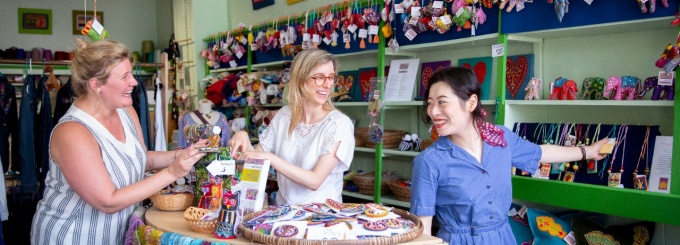
Stitch Buffalo's team members Shannon Lach, Kristie Bailey and Xingyu Chen.
An Ongoing Relationship with UB
Hardworking. Conscientious. Diligent. These are just a few of the glowing adjectives Hoeg uses to describe the Social Impact Fellows—which explains why she’s excited to keep working with students from UB. In fact, in the spring of 2020, Hoeg welcomed a group of UB undergraduate social work students to Stitch Buffalo, where they studied the ways in which Stitch Buffalo benefits local families—a natural extension of the work that the Social Impact Fellows did.
“The Social Impact Fellows really took an in-depth look at everything we do and asked lots of questions to understand what we’re doing—and then understand how they can help the organization, make recommendations, refine and make things better,” said Hoeg.
Ultimately, that’s what programs like the Social Impact Fellows are all about—making things better: better outcomes for organizations such as Stitch Buffalo, a better society through the promotion of social justice, and better experiential learning opportunities for UB students.
As Dean Smyth noted, “Whether it’s providing more ways for refugee women to support their families, or showing our social work students how their insight and experience can change lives, the Social Impact Fellows program continues to provide extraordinary benefits to our students—and our community.”
Abid Alam, Derick Evans and Delaney Voorheis of the LegWorks team examine the prosthetic knee joints the company creates.
Gabriela Cordoba Vivas, Timothy Madden and Elias Schmidt of the Journey's Eng Refugee Services team worked to enhance the sustainability of the Green Shoots for New Americans Program.
Habitat for Humanity Buffalo fellows Danial Khan, Paige Iovine-Wong and Josh Flaccavento at a site in-progress.
Social Impact Fellows participated in a day of building beds for the Beds for Buffalo program with site agency and 2nd place pitch winner, The Service Collaborative of WNY.
SIF participants before the Pitch for a Cause Competition. TOP: Geoffrey Mercene, Timothy Madden, R.J. Haq, Rachit Anand, Kristie Bailey, Macy McDonald, Jake Friedman, Allison Murphy, Gabriela Cordoba Vivas, Delaney Voorheis, Josh Flaccavento BOTTOM: Karolina Kulicka, Sarthak Chakravarty, Julia Schoonover, Elias Schmidt, Paige Iovine-Wong, Mel LeMay, Jordan Sobon, Akshata Gogate, Xingyu Chen, Shannon Lach, Rave Glynn, Azalia Muchransyah, Cassie Malough, Danial Khan, Abid Alam, Meg Denton, Nicole Capozziello, Derick Evans, Yash Shah
